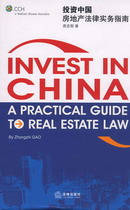
Constitution
The Constitution of the PRC is the fundamental law in China,and the power of enacting the constitution IS vested in the legislative branch of central government,i.e.,the National People’S Congress.
The fundamental law means that the Constitution isthe ground on which the law and regulations are enacted,and if there are conflicts between the Constitution and the law and regulations,the Constitution prevails.However,unlike in the USA,the C0nstitution in China is not enforceable,and a case cannot be brought to court based on the infringement of constitutional rights.
Among other things,the Constitution primarily addresses the land issue in three aspects:
Article 1 0 of the Constitution provides that, first.1and is either state—owned or collectively owned;second,land use rights can be transferred;and third,fOr the public interest,the state can either take or acquire land and make compensation for this.
What constitutes land taking?Is there any difference between land taking and land requisition?What constitutes land acquisition?What is the difference between land requisition and land acquisition?What is the public interest?And what standard should be followed to make compensation?
According to the Statement to the draft Amendments to the Constitution of the PRC on March 8,2004,land taking is a change in land ownership.It can be understood as a permanent suspension of land use rights by the government under the power of eminent domain,and it is always for long—term use.As mentioned earlier,in China,the land iS either owned by the state or by the collective.As a result,land taking should be understood as the conversion of collective land to state land.
Land taking is different from land requisition though they have some aspects in common.For example,both involve the conversion of collective land to state land.However.in terms of difference,land taking occurs for the public interest while land requisition may occur for either public interest or commercial purposes.
Comparatively,land acquisition temporarily suspends land use rights for short-term use while land ownership remains unchanged.
It should be noted that,under the American Constitution,“taking’’of property is a limitation on power rather than a grant of power.However,in China,either taking or acquisition is a grant of Dower.Besides,under the Constitution of the PRC,taking or acquisition only means physical appropriation of real property or land·In other WOrds,if after a land user acquires land,the state amends the law or zoning,and as a result,the land user cannot use the land as planned,this does not constitute taking or acquisition,and the land user cannot seek compensation from the government for this.
Obviously,the public interest plays a crucial role in differentiating land taking from land requisition.Land taking is one type of land requisition and can only Occur if the public interest is involved.However,Chinese law remains silent on defining the Dublic interest.In theory,it should be understood that the land is to be used for public purposes such as health,welfare,safety or moral ends.
As a matter of practice,the public interest is abused,and almost all land use,including land use for commercial purposes is carried out in the guise of public interest.
The Constitution fails to provide that the government should make j ust compensation for landowners as well when it condemns land use right. Although there is a set compensation standard for rural land requistioin or rural house demolition, under other Chinese laws or regulations,it is much lower than the fair market value.
摘自:高忠智著《投资中国:房地产法律实务指南(英文版)》
 Constitution
Constitution